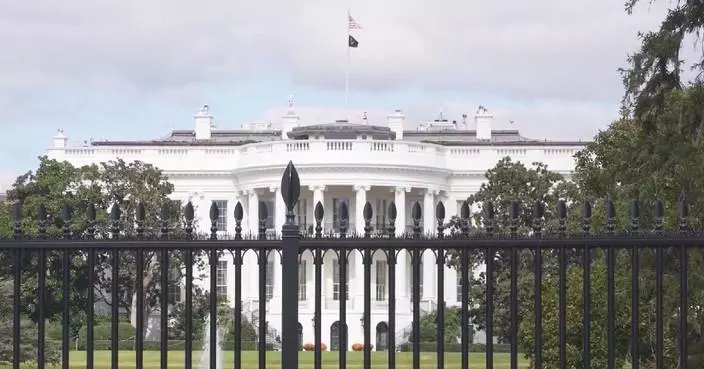The global tariff war ignited by Donald Trump has drawn China’s strongest counter measures . Though China is a surplus economy and the US a deficit one, Beijing’s arsenal of strategic advantages—including diversified export markets, massive holdings of US Treasury bonds, control over critical minerals, and institutional resilience in crises—bolsters its ability to resist American coercion.
On April 15, the Financial Times (UK) analyzed that China’s leverage in the trade war stems from its ability to diversify import sources more easily than the US. Over 15% of China’s total exports flow to the US, yet economists note that China’s imports from America are concentrated in low-value-added agricultural products like soybeans, cotton, beef, and poultry. In contrast, US imports from China—such as electronics, machinery, and processed minerals—are harder to replace.
Marta Bengoa, Professor of International Economics at the City University of New York, stated that while mutual dependency remains high, the US is more vulnerable: “China can source agricultural goods elsewhere far more easily than the US can replace Chinese electronics and machinery.”
Julian Evans-Pritchard, Chief China Economist at Capital Economics, told the Financial Times that market reactions indicate greater pressure on Washington: “The US faces stronger incentives to return to negotiations.”
Since Trump’s first-term tariffs on steel, aluminum, solar panels, and washing machines (2018–2019), China has reduced reliance on US consumer exports. US government data shows China’s share of US imports fell from 21% in 2016 to 13.4% last year. Meanwhile, Chinese manufacturers have shifted production to Southeast Asian nations like Vietnam and Cambodia, leveraging cheaper labor and evading US tariffs. Exports to Vietnam surged 17% in March 2024.
Vietnam, now facing a 124 billion trade surplus with the US, risks a 46 percent “reciprocal tariff “, although it has been suspended for 90 days.
Alicia García Herrero, Chief Economist for Asia-Pacific at French investment bank Natixis and Senior Research Fellow at Bruegel, stated that the suspension “provides some breathing room,” but even if Chinese exports were strictly halted, it would not inflict catastrophic damage on China’s massive economy. Last year, China’s GDP grew by 5%, with 1.5 percentage points attributable to its nearly $1 trillion global trade surplus. “China is a large, resilient economy,” she emphasized.
Bloomberg (US) reported on April 14 that the US, as a consumption-driven economy, harms itself by taxing Chinese goods. Consumers—often overlooked but politically influential—could weaken Trump’s negotiating position. While deficit economies traditionally hold an edge in trade disputes, US reliance on “Made-in-China” goods which is often produced by US firms in China complicates this.
Tariff exemptions for smartphones, laptops, and memory chips highlight this interdependence. Apple, reliant on Chinese production, cannot withstand 145% tariffs.
The Financial Times noted that China’s vast US Treasury holdings—if sold—could destabilize markets, raise concerns about US asset appeal, and accelerate dollar depreciation, increasing import costs. Trump’s April 9 decision to suspend “reciprocal tariffs” for 90 days (retaining a 10% “baseline tariff”) may reflect fears of a Treasury selloff. Reuters reported surging US bond yields last week—the sharpest rise since COVID-19—as investors speculated that China and other reserve managers are reassessing their holdings.
China controls over two-thirds of global rare earth production and 90% of processing capacity—critical for electric vehicle batteries. Despite Trump’s exemptions for key minerals, supply chain risks persist. China’s recent export controls on seven heavy rare earths signal readiness to deploy “new economic weapons,” per analysts Evan Medeiros and Andrew Polk.
Bloomberg observed that Beijing’s calibrated countermeasures—combining tariff retaliation with principled negotiation—demonstrate resolve. On April 10, China’s Commerce Ministry spokesperson reiterated: “Talks are welcome, but only on equal terms. If the US chooses confrontation, China will respond in kind. Pressure and threats are not the way to deal with China.”
Deep Throat
** The blog article is the sole responsibility of the author and does not represent the position of our company. **
After weeks of bluster and escalating threats of so-called "reciprocal tariffs" against China, US President Donald Trump has recently been signalling a "de-escalation" in the Sino-US trade war. However, US media reveals that White House officials privately admit Trump misjudged the situation and failed to accurately predict China's reaction. He apparently assumed China would be among the first countries to "request tariff exemptions," but reality proved otherwise. Media outlets worldwide concur that China, having spent years reducing reliance on American goods, building strong supply chains, and investing in advanced technology, holds multiple "negotiating aces," including US debt holdings and control over rare earth exports. Renowned economists even predict China will emerge victorious from this trade war.
Trump initially projected arrogance both domestically and internationally, not only imposing heavy tariffs on trading partners like China but also threatening to dismiss Federal Reserve Chairman Powell. Yet, after warnings from major US retail chains like Walmart about soaring import prices and panic buying, the Trump administration conceded that the 145% tariff on China is "unsustainable" and is seeking an "exit route" to avoid intensifying the trade conflict.
The New York Times reported on April 23rd local time that Trump demonstrated the political and economic costs of pursuing the most hardline approach. He initiated a trade war in early April, fantasizing that merely imposing "punitive tariffs" would compel global companies to relocate factories back to the US. By month's end, however, he discovered the world of modern supply chains is far more complex than imagined, and whether the tariffs could achieve the desired outcome remained highly uncertain.
The report cited some Trump administration officials privately admitting their failure to accurately predict China's response. Given the vast scale of Chinese exports to the US, Trump seemingly expected China to be among the first to "request (tariff) waivers."
The NY Times noted that while the White House continually hinted China was seeking talks, in reality Beijing adopted a wait-and-see strategy. The report described there were signs of “desperation” as the "call from China" failed to materialize, while Trump was reluctant to initiate the call himself.
Nicholas Mulder, an economic historian at Cornell University, believes "China has been preparing for a further escalation of the trade war for many years". Mulder added that China now possesses greater resilience and capacity to handle such an escalated conflict.
The BBC published an article on the 24th titled, "Five cards China holds in a trade war with the US". First, as the world's second-largest economy, China can withstand the impact of tariffs better than smaller nations; its vast domestic market can cushion some of the pressure exporters face. Second, China has consistently invested in future technologies, pouring funds into indigenous advancements like renewable energy, chips, and artificial intelligence. While US companies attempt to move supply chains out of China, they struggle to find comparable infrastructure and skilled labour elsewhere.
The third ace is the experience China gained from the "Trump 1.0" era. In recent years, it has further strengthened ties with Global South countries, expanding trade with Southeast Asia, Latin America, and Africa. The fourth card is China's awareness that the bond market can influence US decisions. The fifth is China's near-monopoly position in the extraction and refining of rare earths.
On April 22nd US local time, US Treasury Secretary Scott Bessent warned of Sino-US trade tensions in a closed-door speech, frankly telling investors the current stalemate is "unsustainable". He insisted the purpose of US tariffs on China "was not to decouple from China," but admitted that negotiations with China had not yet begun and would be a protracted battle.
On the same day, Trump also signalled from the White House his reluctance to further increase tariffs on China, claiming the rates on Chinese imports would not remain at current levels and would drop substantially, though not to zero.
However, Bessent denied on the 23rd that the US would unilaterally cut tariffs on China. He reiterated that neither the US nor China viewed the current tariff levels as sustainable, stating, "A trade disruption between the two countries is not in anyone's interest."
Also on the 23rd, The Wall Street Journal "leaked" information, citing sources familiar with the matter, that the Trump administration was considering a significant reduction in tariffs on China, possibly by more than half. The news triggered a surge in US stock markets. The report indicated that tariffs on Chinese goods might be reduced to a range of 50% to 65%. However, Trump has not made a final decision, and several options remain under consideration. Among these is a "tiered tariff" scheme, which would apply different rates depending on the type of goods imported from China.
Trump himself stated that day he might announce new tariff amounts for some trading partners, "possibly including China," within the "next two to three weeks." Yet, White House spokesperson Leavitt claimed the US would not unilaterally lower tariffs on China before a new trade agreement was reached.
As The New York Times described it, the White House sent yet another "ambiguous message" regarding the status of negotiations.
On the afternoon of April 24th, addressing recent US messages suggesting ongoing trade talks and even an impending agreement, Foreign Ministry Spokesperson Guo Jiakun stated this was false information. He clarified that China and the US had not held consultations or negotiations on tariffs, let alone reaching any agreement. Guo asserted that the tariff war was initiated by the US, and China's stance remains consistent and clear: “We will fight, if fight we must.” He also said, if the US wants to talk, the doors are open, but dialogue must be based on equality, respect, and mutual benefit.
That same day, Ministry of Commerce Spokesperson He Yadong responded to the US narrative of "tariff cooling," stating that the US's arbitrary imposition of tariffs violates basic economic and market principles. He argued that it not only fails to solve America's own problems but also severely disrupts the international economic and trade order, interferes with normal business operations and consumer life, and has faced strong opposition internationally and within the US. He invoked the saying, "Whoever tied the bell must untie it," implying the unilateral tariffs were initiated by the US, and if the US genuinely wants resolution, it should heed the rational voices internationally and domestically, completely abolish all unilateral tariffs against China, and find ways to resolve differences through equal dialogue.
He Yadong stated that China urges the US to correct its erroneous practices. If talks are desired, the US must show sincerity and return to the correct path of equal dialogue and consultation to jointly promote the stable, healthy, and sustainable development of Sino-US economic and trade cooperation.
Numerous foreign media outlets covering the globally watched Sino-US trade war have cast a vote of confidence in China. The Times of India reported on the 23rd that signs indicate the US is seeking an exit, with the White House seemingly softening its previously tough stance on tariffs. While some see Washington's recent rhetoric as strategic, many experts and investors perceive it more as anxiety.
William Yang, Senior Analyst for Northeast Asia at the International Crisis Group, told Al Jazeera that China will firmly maintain its current position and will only consider starting negotiations after seeing credible actions from the US government. He believes China views the outcome of this tariff standoff as a precursor to how bilateral relations will unfold over the next four years.
Singapore's Lianhe Zaobao commented that the US tariff war against China struggles to achieve its objectives primarily because the US overestimated its leverage and underestimated China's resilience and capacity for countermeasures.
Germany's Stern magazine interviewed Nobel laureate economist Joseph Stiglitz on the 23rd. He stated that China did not back down in the face of US tariff actions, nor did it proactively push for a deal. China concluded it holds the initiative. "If the US reduces purchases of German and Chinese goods, it will face supply problems and higher inflation levels." When asked if China would win the trade dispute with the US, Stiglitz replied, "I think so. China's economic position is solid, while the US is weakening. The Chinese want to be the most reliable trading partner internationally."
The UK's Financial Times reported on the 24th that US companies are calculating the costs of the White House's tariff war. Executives in transportation, energy, telecommunications, and construction have warned about the consequences of the comprehensive tariff actions. Data showed that as of Tuesday, less than one-fifth of the S&P 500 blue-chip companies had held their Q1 financial conference calls,. Over 90% of these calls mentioned tariffs, and 44% mentioned the word "recession."
Domestically in the US, a Pew Research Center poll released on the 23rd showed 59% of American respondents disapproved of the US government raising tariffs, while 39% approved. Another recent Reuters/Ipsos poll indicated only 37% of US respondents were satisfied with the government's handling of economic issues. Concurrently, attorneys general from 12 US states filed a lawsuit demanding that courts declare the federal government's "reciprocal tariffs" illegal and block their implementation.















































